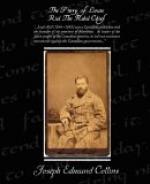When the jury returned with the verdict at 3.15 p.m., after exactly one hour’s deliberation, the prisoner, who had been on his knees in the dock praying incessantly, rose and stood facing the six men who came in bearing for him the message of life or death.
The CLERK of the Court, amid a silence so intense that, like the darkness of Egypt, it could be felt, asked if the gentlemen of the jury had agreed upon their verdict?
MR. COSGROVE, the foreman, answered in a low tone, but heard distinctly in the general hush, “We have!”
The CLERK then asked: “Is the prisoner guilty or not guilty?”
Everyone but the prisoner seemed anxious. He alone of all those present, eager to hear the message of fate, was calm.
The Foreman replied: “Guilty, with a recommendation to mercy!”
Riel smiled as if the sentence in no way affected him, and bowed gracefully to the jury.
THE PRISONER’S SPEECH.
COL. RICHARDSON asked the prisoner if he had anything to say why the sentence of the Court should not be passed upon him?
RIEL replied: Yes, your honour. Then he began, in a low, calm voice to detail the story of the half-breeds in Manitoba, and spoke at length of the rebellion of ’69. He said that if he had to die for what had taken place, it would be a consolation to his wife and to his friends to know that he had not died in vain. In years to come people will look at Manitoba and say that Riel helped the dwellers of those fertile plains to obtain the benefits they now enjoy. He said it would be an easy thing for him to make an incendiary speech, but he would refrain. He said that God had given him a mission to perform, and if suffering was part of that mission, he bowed respectfully to the Divine will, and he was ready to accept the task, even if the end should be death. Like David, he had suffered, but he lacked two years of the time that David suffered. The prisoner then went into the history of the Red River rebellion at great length. He claimed that he had ruled the country for two months for the Government, and his only reward was a sentence of exile. The troubles in the Saskatchewan, he said, were but a continuation of the troubles of the Red River, and the breeds feel that they are being robbed by the Government, which has failed to carry out the treaty promises that had been made to them. The breeds sustained their rights in ’69 by arms, and the people of Manitoba are enjoying the results to-day. The people of Saskatchewan only followed the same precedent, and he trusted that the same results would follow. He then spoke at great length of the part played by Sir John Macdonald, Sir George Cartier, and Bishop Tache in the Red River rebellion. The money that had been given to him and to Lepine on leaving the country had been accepted, he said, as part of what was justly their due. The whites were gradually crowding out the Indians and the Metis,




